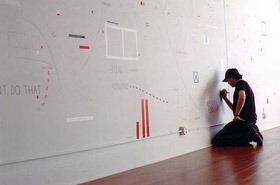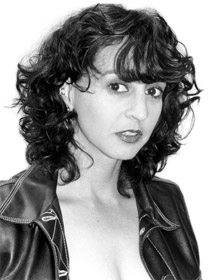Artist Tucker Nichols talks about why he likes early thoughts and exposed decisions, and the importance of not giving other people the keys.

Photo credit: Lisa M. Hamilton.
Recently I realized I’m trying to make work that freezes a moment in time that I would otherwise discard (or refine to make look like other images already in the world). In a text piece, that means writing something down that I’d otherwise pass by and then making a drawing of it later where it’s totally out of context. Or coming up with something slogan-like on the spot and painting it across a storefront window…. Planning a drawing is tempting, but I’ve found it rarely works for me.
With my abstract drawings, it’s more of a puzzle where I make up the rules as I go — like, what would it look like if everything’s being pulled to the edge on the left and there can only be two things and they have to be really different. I’m always trying to stop short of a completed thought because once it’s fully formed, it tends to lose some of its juice for me. Early thoughts have so many different possible outcomes; I prefer thinking about where other people might take them.
And then sometimes I have to draw a glove or a ketchup bottle or a branch because it feels like the right thing to do, and to not draw it would be adhering to some arbitrary rule about what kinds of things I am supposed to draw and what kinds of things I am definitely NOT supposed to draw. The early parts of thoughts don’t obey rules very well.
Are there particular tools that you rely on to gather and develop new ideas?
Absolutely. I go through about fifteen small orange Rhodia pads a year. There’s no set order to the pages, I just fill them up with thoughts or road signs or overheard phrases I’d otherwise forget completely. Then when I’m in the studio I can leaf through them and see what’s worth pursuing — and a lot of it is definitely not worth pursuing. I try to be quick when I take down a note because usually I’m quoting something someone I know just said, and that can be kind of awkward.
I just bought a digital recorder for the car, which was great for a drive on 99 recently but is a bit harder to take ideas off of. Fun to speak into though. Sometimes I feel like I could talk into my thumb and it would be just as useful.
Continue reading →

